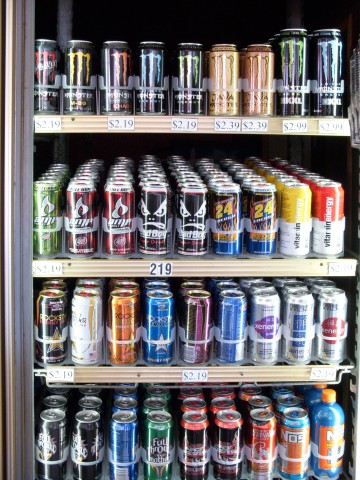 That jolt promised by energy drinks may be delivering more than a sense of high alert.
That jolt promised by energy drinks may be delivering more than a sense of high alert.
There is evidence that the prime energy-boosting ingredients caffeine and taurine can lead to abnormal heart rhythms, according to a study which was presented at the annual meeting of the Radiological Society of North America in December in Chicago.
The results are preliminary and the study is continuing.
“Until now, we haven’t known exactly what effect these energy drinks have on the function of the heart,” said Dr. Jonas Dorner, a radiology resident of the cardiovascular imaging section at the University of Bonn in Germany. “There are concerns about the products’ potential adverse side effects on heart function, especially in adolescents and young adults, but there is little or no regulation of energy drink sales.”
The only time the Food and Drug Administration specifically approved a caffeine-additive was to cola drinks in the 1950s. The federal agency has announced plans to investigate caffeine and energy drinks, especially the effects on young children and teenagers.
Energy drinks, including the popular Monster Energy and 5-Hour Energy, are a multibillion dollar industry. Initially most of the sales were to teenagers and young adults, but recently the appeal has widened to older adults as well.
For the study, researchers looked at 18 healthy volunteers: 15 men and three women with an average age of 27.5 years. One test was done to measure levels of caffeine and taurine before volunteers consumed the energy drinks; a second test was done one hour later.
The results showed that volunteers’ hearts contracted harder while pumping blood through the heart. There did not appear to be any significant difference in blood pressure, heart rate or the amount of blood flow through the heart.
More study is needed to determine why the heart function changed and what the long-term effects might be, Dorner said.
The amount of caffeine in energy drinks usually is about three times more than what is found in coffee or cola. Side effects of excessive caffeine are rapid heart rate, higher blood pressure and in the worst cases, seizure or death, he said.
Adverse effects of energy drinks also were documented in an earlier report from the American Heart Association. Researchers examined seven studies that found increased blood pressure and abnormal heart rhythms after volunteers from age 18 to 45 consumed energy drinks.
Dorner’s advice is for children and people with known irregular heart rates to avoid energy drinks. He also recommends a study on the effects of energy drinks in combination with alcohol.









